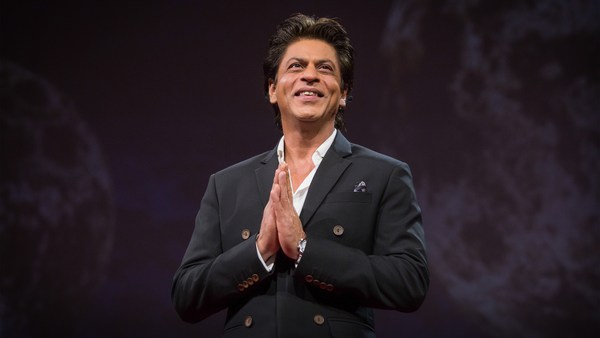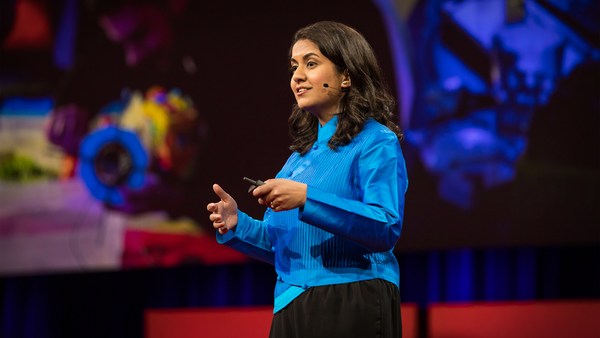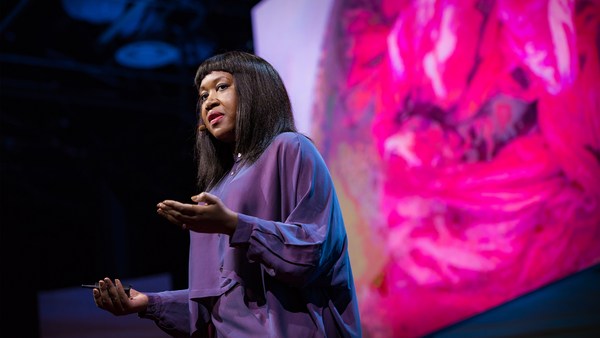Shah Rukh Khan: Everyone wants to know what tomorrow, the next month or the next year holds for them. Joining us from London, our speaker Anab Jain is of the opinion that we do not need any soothsayers to tell us about our future, we just need to look at our world today more closely.
On TED Talks India Nayi Soch to give us today a glimpse into tomorrow's world, we have with us today the multi-talented designer, filmmaker, inventor ... please welcome on stage, Anab Jain. Anab Jain.
(Applause)
Anab Jain: There was a time in India, when you felt like you could really plan your future. I am talking about the '80s. My parents had to plan even for the smallest of things. If you needed a phone, you applied for it and then waited. The phone connection was set up after five years. Then if we had to call our grandparents, a trunk call had to be booked and another long wait. Then one day, at two in the morning, the phone would ring and we would all jump out of bed and shout loudly into the phone. The entire neighbourhood knew who we had spoken to! Which is why today, when we have high tech smart phones, people from that generation still shout on the phone. When they say “Hello” loudly, I just smile.
I belong to that generation as well. These days it seems like things are happening very fast. I don’t understand what status we will have in the history of our times. This uncertainty and fear has us in it’s grasp to such an extent that we don’t think about the future at all. We don’t even try to meet it. We ourselves see our future as a stranger and think our tomorrow is a foreign place. It is no foreign place. We ourselves, every moment, are creating our own future, in front of our own eyes, which is why it’s very important that today we speak up for our tomorrow.
Today on TED Talks India Nayi Soch I have come here to startle you with a glimpse of the future. Have you ever thought about the kind of air we will breathe in Mumbai tomorrow? According to scientists, given the situation today, if we do not change our behavior, then by 2036 Mumbai’s air will be so polluted that it will be full of poisonous gasses and life-threatening particles. It will be something like this to look at and to smell.
Don’t get scared, this is not a sample of the actual air because carrying that would be pretty dangerous for me. But the question is, do we want to give our children such a polluted future as a legacy? How can we change the direction we are headed in? How can we build a bond with our future?
This is my job, but I am not an astrologer. The future I analyze is a future that I have given a face to along with my husband John, in our design studio and laboratory called Superflux. We constantly look at trends and question how we will live in the future. What will we see, what will we hear, how will we breathe? Then we conduct experiments, put together samples for the future, so that you can feel those possibilities and fears today, now, here. We do this because we have seen that this is the most successful way to bring about change. To show people that what they are doing today will result in this tomorrow.
These days, we are in the process of imagining possible future scenarios of 2050. On the basis of estimates of climate changes, we are imagining a future where we will experience floods regularly. Supermarkets will have no water or food for days on end. So what will we do? The question is not just about survival; it’s about how will we make progress even in such a situation. How do we move ahead?
To find answers to these questions, we are creating a room set in 2050. Like a future time capsule. In this room, inspired by our country’s innovative and do-it-yourself culture we are creating what I call "food computers." These food computers are fully automated machines where we use a technique called "fogponics." Fogponics is a technique where, without the use of soil or water, you grow things faster only through fog or mist. Through this technique, we have successfully grown tomatoes and are now trying to grow potatoes, cucumbers and other things. Through new methods and a new outlook, we would like to get this world ready for the future and build a hope that inspires us to a new direction, a new flight ... a new tomorrow that generations to come are proud of.
Thank you.
(Applause)
SRK: Thank you, Anab, for coming here and talking to us.
AJ: Thank you.
SRK: Let's hear it for Anab. Thank you very much.
(Applause)


